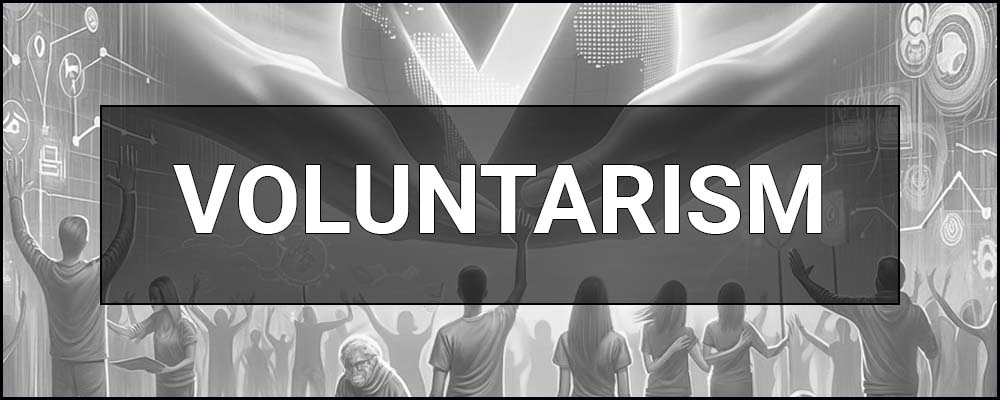Voluntarism is a philosophical and sociological concept that emphasizes the primacy of individual will in the formation of human behavior and social structures. This theory holds that free choice and personal beliefs are key factors in deciding moral, economic, and political issues.
What is VOLUNTARISM – concept and definition in simple words.
In simple words, Voluntarism is the idea that our lives and society are shaped by each individual’s free choice and personal beliefs.
This means that each of us has the power to influence our future and the world around us by making choices guided by our own will and ideas of what is right.

Who is a Voluntarist – concept and definition in simple words.
In simple words, a Voluntarist is a person who believes that the main driver in life is will and personal choice. He is convinced that everyone can shape their destiny and the world around them through the power of their own decisions and beliefs.
Voluntarism: philosophical perspective.
Voluntarism, as a philosophical trend, has deep historical roots going back to antiquity. This direction focuses on the recognition of the will as a central element in the formation of human activity and morality.
Historical roots of voluntarism.
Voluntarism, as a philosophical trend, originated in the depths of ancient philosophy and continued its development in medieval thought, becoming an important part of the Western philosophical tradition.
- Antiquity:
Voluntarism has its origins in ancient philosophers, who pondered the nature of the will and its influence on human existence. Augustine was one of the first to focus on the will as a key to understanding human nature. His views on free will and its role in moral election had a profound influence on Christian theology. - Middle Ages:
During the Middle Ages, William Occam continued to develop the ideas of voluntarism, emphasizing the importance of the will in the process of knowledge. Occam’s Razor, the famous principle of simplicity, actually had its roots in his understanding of the will as a determining factor in human experience. His approaches influenced the further shaping of philosophical and theological debates about the nature of the will.
Voluntarism in ancient and medieval philosophy laid the foundations for the modern understanding of free will and autonomy, emphasizing the role of personal choice in human moral and intellectual life.
Definition of voluntarism in recent philosophy.
In modern times, voluntarism has gained additional scope and depth through the contributions of prominent thinkers. The works of Arthur Schopenhauer, Friedrich Nietzsche, and other philosophers have had a particularly significant influence on this trend.
- Schopenhauer and the primordiality of the will:
Arthur Schopenhauer, a German philosopher, argued that the will is the fundamental force behind all phenomena of the world. He believed that our inner desires are the real drivers of our actions, and even more, it is a fundamental component of all existence. - Nietzsche and the desire for power:
Friedrich Nietzsche developed this thought by introducing the concept of “desire for power”. His views on voluntarism were more complex and radical. Nietzsche argued that the desire for power is not only a desire to control one’s environment or other people, but also a basic instinct that leads to creativity and self-expression.
These more recent philosophical views have greatly expanded the concept of voluntarism, redefining it as a deeper understanding of human inner motivations and drives.
The influence of voluntarism on the perception of free will.
In the modern world, voluntarism not only continues to evolve but also undergoes significant transformations, especially in the context of understanding free will. This strand of philosophy emphasizes the critical role of the will in the processes of decision-making and moral choice, revealing its importance in a wide range of human activities.
- Influences on decision-making:
Voluntarism illuminates how personal will influences the choices we make in everyday life. From everyday routine decisions to the cardinal choices that shape our future, this strand helps us understand how inner beliefs and desires drive our actions. - Moral Choices and Ethics:
Voluntarism also has a significant impact on ethics and morality, revealing how personal beliefs shape our understanding of right and wrong. This approach allows for a deeper appreciation of the moral dimensions of our choices, emphasizing the importance of personal responsibility.
Overall, modern voluntarism makes an important contribution to the understanding of free will by emphasizing how it shapes our actions and interactions in various aspects of life. From personal to social relationships, from professional decisions to moral choices, voluntarism remains a key element shaping our being and interactions with the world.

In sociology, voluntarism is seen as an approach that emphasizes the importance of free choice and individual initiative in shaping social structures and communities. This concept plays a key role in understanding how people unite around common ideas and goals, actively affecting social change.
-
Influencing community building:
Voluntarism promotes the formation of communities where participants come together based on shared values and interests. Through the free association of people with a common purpose, movements are born that can significantly influence social norms and policies.
-
Voluntarism is a driver of social movements, empowering individuals to actively influence society. This is particularly evident when communities or groups speak out against social injustice or seek to change outdated norms and tenets.
-
Real-life examples of change:
One of the most prominent examples of voluntarism was the civil rights movement in the United States, which significantly influenced historical development by fighting for equality and justice. Environmental initiatives such as Greenpeace also demonstrate voluntarism by uniting people around environmental protection. In Ukraine, voluntarism manifested itself during the Revolution of Dignity, when thousands of citizens self-organized, advocating for democratic values and political change, defending their right to choose the future of the country.
Modern voluntarism in sociology emphasizes how people’s individual choices and actions influence collective processes and can lead to important social changes.
Voluntarism in economic theory.
Voluntarism in economics is seen as an approach that emphasizes the importance of free choice and individual decisions in shaping economic processes and market dynamics. This view goes beyond traditional economic models by focusing on the role of personal beliefs and choices in determining economic relationships.
-
Individual decisions and market dynamics:
In voluntarist economics, the individual decisions of consumers and entrepreneurs are key in shaping supply and demand in the market. This emphasizes how people’s personal choices affect pricing, investment, and business development.
-
Influence on economic models:
Voluntarism encourages a rethinking of economic models, drawing attention to human initiative and creativity as drivers of economic development. For example, the concept of the “sharing economy” reflects voluntarist principles where people freely choose to exchange and share resources, transforming traditional market structures.
-
Real-world examples in economics:
An example of the impact of voluntarism on the economy is the proliferation of crowdfunding platforms such as Kickstarter, where people’s individual donations fund innovative projects, supporting creative ideas and entrepreneurship.
Voluntarism in economics opens new horizons for understanding how personal choices and decisions shape economic relations and market processes, emphasizing the importance of human initiative and creativity in economic development.

Voluntarism in everyday life.
Voluntarism in our daily lives is manifested through the decisions we make on a daily basis, demonstrating our personal autonomy and will. This approach emphasizes how important it is for each of us to make conscious and independent choices guided by our own beliefs and values.
- Daily Decisions:
Our daily decisions, such as our choice of occupation, lifestyle, or even our daily shopping, are manifestations of voluntarism. Each such choice reflects our desire to control our own lives and influence the world around us. - Personal Development:
Voluntarism is also important in the context of self-development and self-expression. For example, deciding to volunteer or develop new skills reflects our internal choices and desire for growth. - Examples from everyday life:
A real-life example of voluntarism might be the story of someone who decided to change from a corporate career to a social work career out of a desire to make a social impact. Or the case of someone choosing vegetarianism or an environmentally conscious lifestyle based on personal beliefs about health and the environment.
Voluntarism in everyday life is an expression of our individuality and freedom of choice. It emphasizes how each of us can shape our lives based on our own values and beliefs, and how these decisions affect our personal lives and society as a whole.

Voluntarism in Politics and Governance.
Voluntarism in political theory and governance plays a significant role in emphasizing the importance of individual choice and will in political processes. This approach emphasizes how citizens’ personal beliefs and choices shape the political arena and influence decision-making at the level of government.
Voluntarism in political theory: the will of the people as the basis of governance.
Voluntarism in political theory emphasizes that the real essence of governance and political processes lies in the will of the people and their active participation in political life. This concept is fundamental to democratic systems where power emanates from the people and serves their interests.
-
Principles of Democracy:
In a democracy, civic choice plays a key role in shaping the government and its policies. Voluntarism in this context reflects the importance of free and fair elections, active public participation and transparency in governance.
-
Role in policymaking:
The approach of voluntarism in politics includes the idea that every citizen has the right and responsibility to participate in the political process, to contribute to the shaping of political agency and to choose representatives.
Voluntarism in political theory is an important element in understanding how citizens can and should actively participate in the formation and realization of political will, both locally and nationally. This approach emphasizes the importance of an active public stance and responsibility of every citizen in a democratic society.
Historical and contemporary influence of voluntarism in political movements.
Historically, voluntarist ideas have been the motivation for numerous political movements and revolutions that sought change based on the popular will. Throughout the centuries, voluntarism has inspired struggles for independence, social justice, and democratic reform.
-
Historical Revolutions and Movements:
Landmark examples of voluntarism’s historical influence are the American and French Revolutions, where the desire for freedom and self-government prompted massive change. These revolutions emphasized the power of the popular will and its ability to dramatically change the political map of the world.
-
Modern political movements:
In the modern world, voluntarist principles continue to influence the political landscape. Human rights movements, environmental initiatives, and gender equality and LGBT+ rights movements draw on ideas of voluntarism to emphasize the importance of active citizen participation in the political process.
Voluntarism in political movements has emerged as a powerful tool for social change, demonstrating that collective action based on shared values and beliefs can significantly influence the shaping of policies and social structures. It is a reminder that every individual has an important role to play in shaping and sustaining a healthy democratic society.

Voluntarism on the global stage.
Voluntarism on the global stage plays a key role in shaping international relations and global initiatives, demonstrating how individual and collective actions of citizens can influence international political and social processes.
- Impact on International Relations:
Voluntarism in international relations is expressed through a range of diplomatic and public initiatives where countries and peoples cooperate on the basis of shared values and interests. This applies to issues such as human rights, environmental security and development. - Global initiatives:
Voluntarist principles underpin many global initiatives, such as the UN’s sustainable development programs, which aim to fight poverty, protect the environment, and promote peaceful coexistence among peoples. - International examples of voluntarism:
A prime example of voluntarism in action is the global climate change movement, which unites millions of people around the world to implement environmental reforms. Another example is international volunteer programs that promote cultural exchange and social issues in different countries.
Voluntarism on the international stage demonstrates how activism and volunteerism can make a significant contribution to global development, strengthening international relations and supporting the global community. It emphasizes that the efforts of each individual and group have weight in shaping a better world.
Conclusion.
In this article, we have examined voluntarism as a multidisciplinary concept encompassing philosophy, sociology, economics, everyday life, politics, and global processes. Voluntarism, at its core, emphasizes the importance of individual choice and will in shaping personal life, society and political structures. It plays a key role in shaping contemporary political and social movements by emphasizing the power of personal initiative and activism.
It remains an open question how voluntarism will continue to influence global change in the future. Can individual choice and the will of each person continue to be a driving force in addressing global challenges and building a just world? This question remains relevant for each of us to ponder.

FAQ (Frequently Asked Questions):
Voluntarism is a philosophical and sociological concept that emphasizes the importance of an individual’s will and choices in shaping their lives and society.
Voluntarism influences our daily decisions and choices by emphasizing the importance of personal beliefs in shaping our life path.
Voluntarism is based on the idea of free choice, whereas determinism assumes that events and actions are determined in advance by external or internal causes.
In economics, voluntarism reflects the importance of the individual decisions of consumers and entrepreneurs in shaping market processes.
Voluntarism in politics emphasizes the importance of active public participation and the will of the people in shaping government and political decisions.
Historical examples such as the American and French Revolutions demonstrate the influence of voluntarism in shaping modern democracies.
Voluntarism supports the idea of human rights by emphasizing the importance of individual freedom and freedom to choose one’s way of life.




